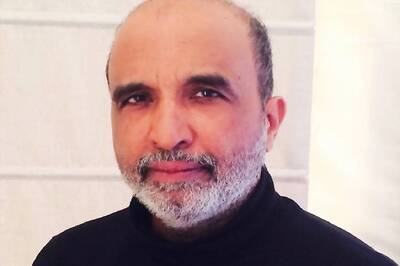
views
THIRUVANANTHAPURAM: Music aficionados in the city got their platter filled with a new dish, quintessentially Mediterranean and Spanish, but with flavours from across the globe, on Saturday evening when Franco-Algerian singer Akim El Sikameya went live before them. Akim, the first contemporary Arab singer to perform live in the capital city, enthralled them with his wizardry on violin strings, coupled with his soulful singing. The programme was organised by Alliance Française de Trivandrum. Akim sang in Arabic, of which the audience did not understand a word. But his music filled the gap. The audience tapped their feet, swayed their heads, clapped their hands and danced as if in ecstasy, listening to his mesmerising music. Just like his bow bridges the gap between the parallel strings on his violin, Akim El Sikameya wishes to bridge the gap between various traditional genres of music, creating a new sound of music in the process. That explains the myriad styles of music that reflect in his songs. ‘’For me, traditional music does not exist,’’ says Akim, who has developed his own unique style of music. Music does not stay in one place. It travels, crosses barriers, transcends its own boundaries. Hence, there can’t be something like traditional music, puts in the man whose claim to fame, not surprisingly, happens to be his gypsy style of rendition. Akim, 35, calls his music Arab-Andalusian. Arab, because he was born and brought up in Oran, in Algeria, located in the northern part the of African continent, and Andalusian, because his parents hail from Andalusia, a district in southern Spain. His childhood days in Oran, according to him, might be the reason for his love for exploring the music of different cultures. ‘’Oran, despite being an African town, had a big Spanish population, as exiles from Spain found refuge here. There were also a lot of Jews around. The whole province was a melting pot in which different cultures blended together,’’ he says. It is not his style of music that sets him apart from others. He has a unique way of holding the violin inverted, with the instrument’s bout mounted on his thigh, unlike the traditional way of placing it under the chin. This helps me to sing simultaneously as I play it, he explains. ‘’It also helps me to move around and make the performance lively,’’ he adds. For someone who had started playing music at the age of eight, music never meant work. It is his passion and pleasure. For him, his music is a journey seeking the merger between music and emotional transformation, which the Arabs refer to as the concept of ‘tarab’. And he wanders like a gypsy, seeking ‘tarab’.



















Comments
0 comment